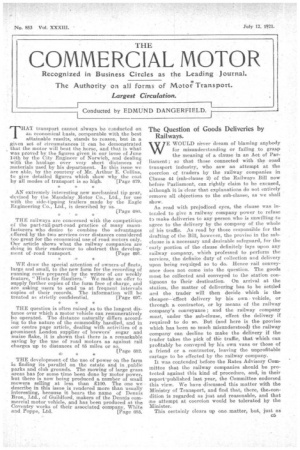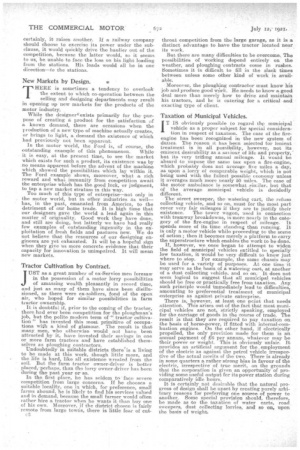The Question of Goods Deliveries by Railways.
Page 1

Page 2

If you've noticed an error in this article please click here to report it so we can fix it.
E WOULD never dream of blaming anybody for misunderstanding or failing to grasp the meaning of a clause in an Act of Parliament; so that those connected with the ,road transport industry, who saw an attempt at the coercion of traders by the railway companies in Clause 44 (sub-clause 2) of the Railways Bill now before Parliament, can rightly claim to be excused, although it is clear that explanations do not entirely -remove all objections to the sub-clause, as we shall show.
As read with prejudiced eyes, the clause was in tended to give a railway company power to refuse ti make deliveries to any person who is unwilling to agree to the delivery by the company of the whole of his traffic. As read by those responsible for the drafting of the Bill, however, the proviso in the sub clause is a necessary and desirable safeguard, for the ' early portion of the clause definitely lays upon any railway company, which professed to perform the services, the definite duty of collection and delivery upon being regained so to do. Hence rail convey ance does not come into the question. The goods must be collected and conveyed to the station con tiguous to Their destination. On arrival at the station; the matter of delivering has to be settled and the trader will then decide which is the cheaper—effect delivery by his own vehicle, or through a contractor, or by means .of the railway company's conveyance ; and the railway company must,under the sub-clause, effect the delivery if required to do so. But (and here is the proviso which has been so much misunderstood) the railway company can decline to make the delivery if the trader takes the pick of th-e traffic, that which can profitably be conveyed by his own vans or those of a friend or a contractor, leaving the unprofitable cartage to be effected by the railway company.
It was contended before the Rates Advisory Com mittee that the railway companies should be protected against this kind of procedure, and, in their report 'published last year, the Committee endorsed this view. We have discussed this matter with the Ministry of Transport, and find that, there, thescon dition is regarded as just and reasonable, and that no attempt at coercion would be tolerated by the Minister.
This certainly clears up one. matter, but, just as certainly, it raises another. If a railway company should choose to exercise its power under the subclause, it would quickly drive the haulier out of the competition, because the latter would, so it seems to us, be unable to face the loss on his light loading from the stations. His loads would all be in one direction—to the stations.
New Markets by Design. 0
THERE is sometimes a tendency to overlook the extent to which co-operation between the selling and designing departments may result in opening up new markets for the products of the motor industry.
While the designerrexists primarily for the purpose of creating a product for the satisfaction of a known demand, there are occasions when the production of a new type of machine actually creates, or brings to light, a demand the existence of which had previously not been apparent.
In the motor world, the Ford is, of course, the outstanding example of this phenomenon. While it is easy, at the present time, to see the market which exists for such a product, its existence was by no means, apparent before the advent of the machine which showed the possibilities which lay within it. The Ford example shows, moreover, what a rich reward and what immunity from competition await the enterprise which has the good luck, or judgment, to tap a new market stratum in this way.
Too much of this type of enterprise—not only in the motor world, but in. other industries AS well— has, in the past, emanated from America, to the detriment of our home trade. It is high time that our designers gave the world a lead again in this matter of originality. Good work they have done, and still are doing, but latterly we have had really few examples of outstanding ingenuity in the exploitation of fresh fields and pastures new. We do not believe that the resources of our designing engineers are yet exhausted. It will be a hopeful sign when they give us more concrete evidence that their capacity for innovation is unimpaired. It will mean new markets.
Tractor Cultivation by Contract.
JUST as a great number of ex-Service men foresaw in the possession of a motor lorry possibilities of amassing wealth pleasantly in record time, and just as many of them have since been disillusioned, so there were ex-soldiers, fond of the open air, who hoped for similar possibilities in farm tractor ownership.
It is doubtful if, prior to the coming of the tractor, there had ever been competition for the ploughman's job, but the polite modern term of -" tractor cultivation" has invested this most primitive of occupations with a kind of glamour. The result is that many, men, who otherwise would riot have been attracted by it, have invested their savings in one or more farm tractors and have established themselves as ploughing contractors.
Undoubtedly in suitable districts thereris a living to be made at this work, though little more, and the life is hard, like all existence wrested from the soil. But the farm tractor owner-driver is better placed, perhaps, than the lorry owner-driver has been during the past year or so.
In the ftrat place, he has seldom to face severe competition from large concerns. If he chooses a suitable locality, one in which, for preference, small farms abound, he is likely to find his services valued and in demand, because the small farmer would often rather hire a tractor when he wants it than buy one of his own. Moreover, if the district chosen is fairly remote from large towns, there is little fear of cut ei throat competition from the large garage, as it is a distinct advantage to have the tractor located near its work.
But there are many difficulties to be overcome., The possibilities of working depend entirely on the weather, and ploughing contracts come in rushes. Sometimes it is difficult to fill in the slack times between unless some other kind of work is. available.
Moreover, the ploughing contractor must know his job and produce goad work. He needs to know a good deal more than merely how to drive and maintain his tractors, and he is catering for It critical and exacting type of client.
Taxation of Municipal Vehicles.
I3' IS obviously possible to regard. the municipal vehicle as a proper subject for special consideration in respect of taxation. The case of the fireengine has been 'recognized in the new system of duties. The reason it has been selected for lenient treatment is in all possibility, however, not its eminent desirability as a saviour of life and property, but its very trifling animal mileage. It would be absurd to impose the same tax upon a fire-engine, which probably does not average five miles a day, as upon a lorry of comparable weight, which is not being used with the fullest possible economy unless it averages much more pearly 50 miles. The case of the motor ambulance is somewhat . similar, but that of the average municipal vehicle is decidedly different.
• The street sweeper, thewatering cart, the refuse collecting vehicle, and so on, must for the most part cover very fair mileages if they are to justify their existence. The tower wagon, used in connection with tramway breakdowns, is more nearly in the category of the fire-engine in respect of mileage. It spends more of its time standing than running. It is only a motor vehicle while proceeding to the scene of action ; then it becomes merely a platform to carry the superstructure which enables the work to be done.
If, however, weonce began to attempt to widen the field of municipal vehicles entitled to specially low taxation, it would be very difficult to know just where to stop. For example, the same chassis may be used for a variety of purposes. At one time it may serve as the basis of a watering cart, at another of a dust collecting vehicle, and so on.It does not seem logical to suggest that all municipal vehicles should be free or practically free from taxation. Any. such principle would immediately lead to difficulties, amounting to preferential treatment of municipal enterprise as against private enterprise.
There is, however, at least one point that needa attention. This arises out of the fact that most municipal vehicles are not, strictly speaking, employed for the carriage of goods in the course of trade. The result is that they are required to pay taxation on the basis of horse-power, if fitted with internal-combustion engines. On the other hand, if electrically propelled, the only provision made for them is an annual payment of £6 per annum, whatever may be their power or weight. This is obviously unfair. It provides an artificial argument for the . employment of the electric As against the petrol vehicle irrespective of the actual merits of the two. There is already . in some quarters a rather strong bias in favour of the electric, irrespective of true merit, on the grounds that the corporation is given an opportunity of providing some useful output for its power station during comparatively •idle hours.
It is certainly not desirable that the natural progress of design shall be upset by creating purely arbitrary reasons for preferring one sourceof power to another. Some special provision should, therefore, be made as to the taxation of water carts, road sweepers, dust collecting lorries, and so on, upon the basis of weight.
































